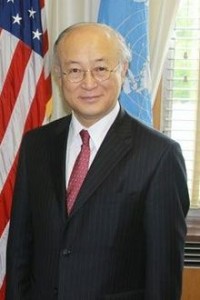From U.S. embassy cables leaked by Pvt. Bradley Manning, you can easily imagine how the propaganda game might have played out, how Americans could have been panicked into supporting another unnecessary war in the Middle East, this time against Iran. Except that Manning's release of the documents spoiled the trick.
The gambit might have gone this way: One morning, a story would have led the front page of, say, the Washington Post citing how the widely respected International Atomic Energy Agency and its honest-broker Director General Yukiya Amano had found startling "evidence" that Iran was nearing a nuclear bomb -- despite a longstanding U.S. intelligence estimate to the contrary and despite Iranian denials.
Neo-con think tanks would rush to join the chorus of alarm, dispatching WMD "experts" to TV talk shows bracing the American people on the need for military action. From Fox News to CNN to MSNBC, there would be a drumbeat about Iran's perfidy. Then, as hawkish Republicans and Democrats ratcheted up their rhetoric -- and as Israeli leaders chortled "we told you so" -- the war-with-Iran bandwagon might have begun rolling with such velocity that it would be unstoppable. Next, the neocon-dominated opinion pages would ridicule anyone who still doubted these "facts." After all, these articles would say, "even" the IAEA, which had challenged President George W. Bush's claims about Iraq in 2002, and "even" Amano, who had initially believed Iran's denials, were now convinced.
Perhaps, only years later -- after grave human costs and severe economic repercussions -- would the American people learn the truth: that the IAEA under Amano wasn't the objective source that they had been led to believe; that Amano was something of a U.S.-Israeli puppet who had feigned a pro-Iranian position early on to burnish his credentials for pushing an anti-Iranian line subsequently, that after he was installed, he had even solicited U.S. officials for money and had held secret meetings with Israelis (to coordinate opposition to Iran's nuclear program while maintaining a polite silence about Israel's rogue nuclear arsenal).
However, because of the actions of Bradley Manning, the rug was pulled out from under this possible ruse. The U.S. embassy cables revealing the truth about Amano were published by the U.K. Guardian in 2011 (although ignored by the New York Times, the Washington Post and other mainstream U.S. news outlets). The cables also drew attention from Web sites, such as Consortiumnews.com.
So, the gambit could not work. If it had been tried, enough people would have known the truth. They wouldn't be fooled again -- and they would have alerted their fellow citizens. Bradley Manning had armed them with the facts.
And this scenario, while admittedly hypothetical, is not at all far-fetched. When the cables were leaked about a year after Amano's appointment, his IAEA was busy feeding the hysteria over Iran's nuclear program with reports trumpeted by think tanks, such as the Institute for Science and International Security, and by the Washington Post and other U.S. news media.
Revealing Cables
According to those leaked U.S. embassy cables from Vienna, Austria, the site of IAEA's headquarters, American diplomats in 2009 were cheering the prospect that Amano would advance U.S. interests in ways that outgoing IAEA Director General Mohamed ElBaradei wouldn't; Amano credited his election to U.S. government support; Amano signaled he would side with the United States in its confrontation with Iran; and he stuck his hand out for more U.S. money.
In a July 9, 2009, cable, American charge Geoffrey Pyatt said Amano was thankful for U.S. support of his election. "Amano attributed his election to support from the U.S., Australia and France, and cited U.S. intervention with Argentina as particularly decisive," the cable said.
The appreciative Amano informed Pyatt that as IAEA director general, he would take a different "approach on Iran from that of ElBaradei," and he "saw his primary role as implementing safeguards and UNSC [United Nations Security Council]/Board resolutions," i.e., U.S.-driven sanctions and demands against Iran.
Amano also discussed how to restructure the senior ranks of the IAEA, including elimination of one top official and the retention of another. "We wholly agree with Amano's assessment of these two advisors and see these decisions as positive first signs," Pyatt commented.
In return, Pyatt made clear that Amano could expect strong U.S. financial support, stating that "the United States would do everything possible to support his successful tenure as Director General and, to that end, anticipated that continued U.S. voluntary contributions to the IAEA would be forthcoming." Amano offered that a "reasonable increase' in the regular budget would be helpful."
Pyatt learned, too, that Amano had consulted with Israeli Ambassador Israel Michaeli "immediately after his appointment" and that Michaeli "was fully confident of the priority Amano accords verification issues." Michaeli added that he discounted some of Amano's public remarks about there being "no evidence of Iran pursuing a nuclear weapons capability" as just words that Amano felt he had to say "to persuade those who did not support him about his 'impartiality.'"
In private, Amano agreed to "consultations" with the head of the Israeli Atomic Energy Commission, Pyatt reported. (It is ironic indeed that Amano would have secret contacts with Israeli officials about Iran's alleged nuclear weapons program, which has yet to yield a single bomb, when Israel possesses a large and undeclared nuclear arsenal.)
In a subsequent cable dated Oct. 16, 2009, the U.S. mission in Vienna said Amano...
(Note: You can view every article as one long page if you sign up as an Advocate Member, or higher).






